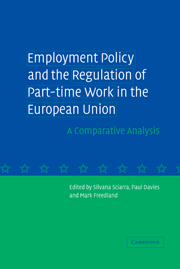Book contents
- Frontmatter
- Contents
- List of figures and tables
- Notes on contributors
- Preface
- List of abbreviations
- PART I
- PART II
- 4 France: part-time work – no longer an employment policy tool
- 5 Germany: part-time work – a bone of contention
- 6 Italy: adaptable employment and private autonomy in the Italian reform of part-time work
- 7 The Netherlands: from atypicality to typicality
- 8 Spain: the difficulty of marrying flexibility with security
- 9 Sweden: part-time work – welfare or unfair?
- 10 The United Kingdom: how is EU governance transformative?
- Index
8 - Spain: the difficulty of marrying flexibility with security
Published online by Cambridge University Press: 30 July 2009
- Frontmatter
- Contents
- List of figures and tables
- Notes on contributors
- Preface
- List of abbreviations
- PART I
- PART II
- 4 France: part-time work – no longer an employment policy tool
- 5 Germany: part-time work – a bone of contention
- 6 Italy: adaptable employment and private autonomy in the Italian reform of part-time work
- 7 The Netherlands: from atypicality to typicality
- 8 Spain: the difficulty of marrying flexibility with security
- 9 Sweden: part-time work – welfare or unfair?
- 10 The United Kingdom: how is EU governance transformative?
- Index
Summary
Introduction
Working shortened hours is not a form of work that can be described as anything new. For as long as can be remembered contractual arrangements have been made under which the working time fell short of whatever happened at the time to be specified as the statutory or collectively agreed normal working hours. As a long-established practice, throughout much of the history (or perhaps sub-history) of industrial relations in Europe, part-time work remained confined to areas of social marginalisation and exclusion from legal regulation; it attracted no attention from the public authorities or interest from the actors of industrial relations, who were at one in being preoccupied with constructing a system of employee guarantees based on full-time work.
First ‘discovered’ in the 1960s as a solution to labour shortages by facilitating access to the labour market for groups unavailable for full-time work (young people still completing their studies and, most of all, women with family commitments), during the 1970s part-time work took on an additional new function as an instrument of demographic policy: by making it possible to reconcile family and professional life it came to be used as an incentive in order to offset falling birth rates. Only in the decades since then, however, has part-time work become a prominent feature of European industrial relations systems as a result of the sweeping changes of every kind (economic, technological, social and cultural) taking place in our societies.
- Type
- Chapter
- Information
- Employment Policy and the Regulation of Part-time Work in the European UnionA Comparative Analysis, pp. 224 - 257Publisher: Cambridge University PressPrint publication year: 2004
- 1
- Cited by



